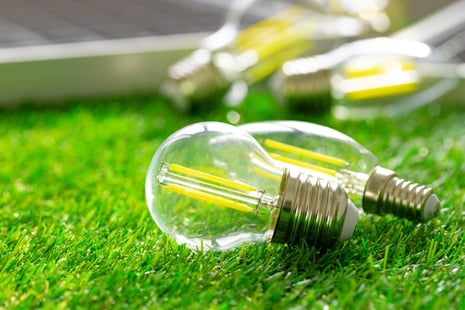
Every December 14th, the entire country of India recognizes National Energy Conservation Day. Read the full article to learn three easy ways we can celebrate and embrace National Energy Conservation Day in the United States.
Every December 14th, the entire country of India recognizes National Energy Conservation Day. Across 56 sub-sectors of the 1.38-billion-person country, government officials recognize the country’s massive achievements in both conserving energy and pursuing sustainable, renewable forms of energy production.
Unfortunately, we lack an equivalent holiday in the United States or even an equivalent nationwide push for energy sustainability and environmental conservation through energy conservation.
Our current situation is such that increasing amounts of greenhouse gases (namely carbon dioxide, but others, too) become trapped within the earth’s atmosphere. The trapped gases prevent heat energy absorbed by sunlight from escaping the earth’s atmosphere, warming the planet overall and causing devastation. Melting polar ice caps, disappearing glaciers, sinking coastlines, mass extinctions – the outlook is dire if action isn’t taken soon.
Energy conservation is just one way to mitigate the environmental mess we’re in. It should come as no surprise – energy generation has been the primary driver behind our current warming trend. According to research compiled by the National Aeronautics and Space Administration (NASA), our current warming trend is occurring at ten times the rate the earth warmed following the last Ice Age, roughly 12,000 years ago. Unfortunately, this faster rate also coincides with increased carbon emissions from human sources, increasing 250 times faster than from natural sources after the last Ice Age.
How does this relate to your energy usage? It’s simple: the overwhelming majority of electricity in the world, around 85 percent, is still generated by burning oil, coal, or natural gas, all of which produce carbon dioxide as a byproduct.
All that to say, energy conservation is imperative while humanity strives toward more sustainable forms of energy generation. Where to start as an individual, however, can feel daunting. Here are a few ways you can begin.
1. Start at home.
The easiest way to start conserving energy today also offers your household the most immediate financial benefit: start identifying and eliminating points of energy waste and inefficiency in your everyday life.
Before you start replacing every appliance in your home, first take an honest stock of your own energy usage. Do you leave lights on, even when you don’t actively need them on? Do you leave your appliances plugged in and turned on, even when not in use? Do you run your dishwasher, washing machine, or dryer, even when they aren’t ready for a “full” load? Any of these and more are small ways you may be unnecessarily wasting energy at home, and environmental impact aside, your wallet suffers too with every monthly electric bill.
2. Consider appliance and hardware swaps.
Today, most new homes and appliances are outfitted with appliances, wall outlets, and electrical infrastructure that meet some minimum energy efficiency standard, but older homes – or older sets of appliances – may be sucking massive amounts of unnecessary energy.
As budget allows, it may be a good idea to look for more energy-efficient appliances or consult with an electrician to update your home wiring.
Another measure you can take is to swap your regular old incandescent light bulbs for LED bulbs. LED bulbs can be as much as 80 percent more efficient, and while you may think you dislike the harsh, bluish light emitted by LED bulbs of yore, modern home LEDs come in a range of styles from cool white to warm yellow.
One more way you could address your energy efficiency is to assess your home’s insulation. Poorly insulated homes may leak too much cool or hot air – air that you’ve used energy to cool or heat.
3. Make the switch to solar energy.
The final and most long-term impactful way to use less non-renewable energy is to make the switch to fully renewable energy sources. Unfortunately, renewable energy isn’t available in most U.S. markets, so this means exploring solar power options for most homeowners.
More U.S. homes are turning to solar energy than ever before as a way to drastically reduce – or even eliminate – their reliance on local power grids and non-renewable energy. A reputable and experienced solar provider like DFW Solar Electric can accurately assess your home’s solar energy potential, placing panels in the correct position and orientation to maximize the electricity you generate.
The up-front cost is often seen as a barrier for the average American homeowner. However, in most U.S. states and local communities, homeowners can apply for government-sponsored grants, financing options, and subsidies to help pay for a solar installation. With these options providing the easiest access to solar energy in decades, your solar installation can end up paying for itself in overall savings in surprisingly short order.
DFW Solar Electric customers save an average of $1203 per year. Those savings translate directly into energy that did not come from non-renewable sources and is thus better for the environment. Switching to solar doesn’t just improve your budget’s bottom line but improves the planet for us all and for generations to come.
If you’re interested in a solar installation for your home or business, contact DFW Solar Electric today at 972-827-7651 or visit https://www.DFWSolarElectric.com to learn more. We’ll connect you with a solar energy expert who can arrange an assessment of your home and provide an estimate of the money (and energy!) you can save every year. The best time to turn to solar power was 20 years ago, but the second-best time is today.
Our Solar Energy Solutions
Are you thinking about a solar panel system for your home or business? Give us a call at 972-827-7651 or click HERE to get a free, no-obligation consultation, and we'll perform a detailed analysis to help you determine which solar panels make sense for you.
Comments